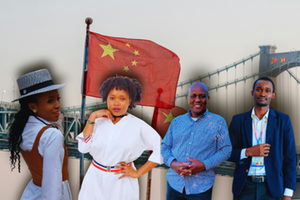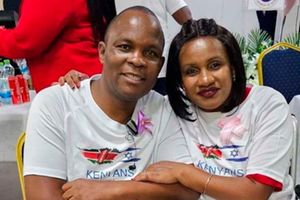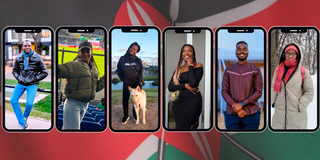
The romanticised image of studying abroad, as often depicted on social media, contrasts starkly with the harsh reality.
To many young Africans, the idea of studying or living abroad gleams like a promise — a passport to success, freedom, and reinvention. On Instagram or TikTok, life looks like a fantasy: glowing testimonials of “making it.” But beyond these carefully curated moments lies another reality — one rarely spoken of, even more rarely seen. Loneliness.

The romanticised image of studying abroad, as often depicted on social media, contrasts starkly with the harsh reality.
When Barasa Oliver arrived in Moscow, Russia in October 2023, he expected challenges but nothing prepared him for what came next.
Oliver was 30. He had had experiences working in Kenya’s healthcare system, hence he thought life was not going to be so tough.
“I used to work at Gertrude’s Children Hospital during the Covid-19 pandemic, and later at German Medical Center in Nairobi’s Upper Hill,” he tells Lifestyle.
In search of a better life, Oliver set his sights on Hungary, where many of his friends had already found opportunities. “All of my friends were there,” he says. “But when I didn’t get a chance, someone I knew from university told me about a Russian government scholarship.”
That tip changed his path. Oliver secured a scholarship to pursue a Master’s in Public Health, specialising in Clinical Epidemiology, at a medical university in Moscow. Looking back, he admits one critical misstep: “I didn’t research the country thoroughly enough before coming.”
“I had learned about Russia in history books and movies, but nothing prepared me for the reality,” says Oliver.
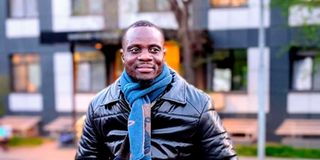
Barasa Oliver, 30, is a Kenyan pursuing a Master's in Public Health (Clinical Epidemiology) at first Moscow medical university on Russia.
He arrived in Moscow at the peak of winter. “The cold was extreme. I’m from Bungoma County, and I have never experienced anything close to -32°C. My hands literally froze at the airport,” he recalls. But the biting cold wasn’t the only shock. The language barrier quickly became overwhelming. “I didn’t speak Russian, and very few people spoke English. Even basic tasks—like buying a SIM card—became impossible.”
In Kenya, he says, he was accustomed to greeting people on the street. “Here, people do not greet each other. It was culturally disorienting.”
As a social person, loneliness hit him hard.
“The first three months were the hardest,” Oliver admits. “I went through mental breakdowns, overwhelming anxiety, and deep homesickness. There were moments I seriously considered going back home.”
Alone in hospital
Oliver recalls a harrowing winter accident when he slipped on icy roads and broke his hand. “Trying to explain myself to doctors who only spoke Russian was terrifying,” he says. In another incident, he was hospitalised for a week with gastritis. “I was completely alone—no visitors were allowed. Back in Kenya, my family would have been by my side throughout.”
In a bid to stay afloat, Oliver sought survival strategies. “I took the initiative to build a support system,” he says.
He connected with fellow Kenyan students in Moscow and found comfort in an English-speaking African church community. “That community made me feel visible again.” To cope with the emotional strain, he stayed in regular contact with friends back in Kenya via Zoom. “They became my unofficial therapists—they kept me grounded,” he recalls.
Through intentional socialising, church, and peer support, he has found balance.
“I’ve learned the importance of stepping out of my comfort zone and asking for help.”
To students abroad-bound, Oliver offers this advice: “Lower expectations. Research deeply. Prepare yourself mentally, emotionally, and financially. And parents please don’t pressure your children to look successful immediately. Just surviving in a foreign country is already a big success.”
“It’s not always as glamorous as people imagine. But with grit and the right kind of support, it becomes achievable and even worthwhile.”
Place without welcome
In September 2023, Elizabeth Tairo from Arusha Tanzania, took a bold step. She too travelled to Moscow, Russia, to pursue her Master’s degree in Epidemiology and Public Health on a scholarship.
“I did a Bachelor’s in Medical Laboratory Sciences at Mount Kenya University,” the 28-year-old says, “before going back to Tanzania for my internship at Kilimanjaro Christian Medical Centre before getting this one.”
Although she had previously lived abroad in Kenya, life in Moscow felt like an entirely different world. The biggest challenge? Language. “They don’t speak English here,” she explains. “You can’t even ask someone for directions on the street without being ignored.”

Elizabeth Tairo, 28, is a Tanzanian pursuing a Master's in Epidemiology and Public Health at I.M Sechenov Medical University in Moscow.
Arriving in a foreign land with no family or friends, Elizabeth felt lost and alone. It took seven long days before she was finally granted university accommodation. “I went to the office every day, and they kept saying, ‘Come back tomorrow,’” she recalls. “It started to break me. I cried. I called my mother.”
That marked the onset of her battle with depression. The overwhelming isolation, persistent language barrier, and stark cultural differences stirred a deep emotional turmoil within her. “My mental health was in a terrible state. I cried all the time. Aside from occasional phone calls with my parents, I had no one to talk to,” she says.
She never saw a therapist, partly because she had no clue where to seek it.
A naturally introverted person, she liked staying indoors, but when the emotional pressure became too much, she forced herself to step outside. “I would go for walks or jog. Gradually, I met some friends. That helped somewhat.”
Now, nearly a year later, Elizabeth says she is still adjusting to life abroad. “I haven’t fully adapted yet, but I’m improving. I can at least speak simple Russian phrases now,” she says.
But still, there is homesickness. “This place is not like home. It never feels like home.”
Looking back, Elizabeth wishes she had learned the language before moving. “That would have made everything so much easier,” she admits. To anyone dreaming of life abroad, she offers a candid reality check: “It’s not perfect here. People back home think it’s all rosy. But here, you’re alone. It’s hard. But I’m determined to complete my studies and return home. Home is the best.”
Harsh new world in Australia
At just 17, Salome Damaris Nanjira made a life-altering decision—she left Kenya for Australia. What began as a promising academic journey in Chemical Engineering at a Kenyan university quickly turned sour. After her classes were abruptly withdrawn, she was forced to repeat her entire first year. But worse than the academic setback was the discrimination she faced. “Hapa sio kwa Waluhya, ukitaka marks enda ...,” she was told.
This heartbreak and injustice prompted her mother to suggest a fresh start abroad. Inspired by friends already living in Australia who spoke of freedom and opportunity, Salome prepared for migration and left in 2016.
“They [friends living abroad] talked about employment, success, and freedom. I was hooked,” she says.
But the reality of Australia proved far more complex than Salome had imagined. “The airport was modern, the trains were quiet, and everyone seemed to own a car,” she recalls. “Yet behind closed doors, something didn’t feel right—there was a subtle but real undercurrent of racism.”
Just weeks into her stay, her living situation changed unexpectedly. Her host family could no longer afford to keep her due to rising costs and they asked her to move out.

Salome Damaris Nanjira, 26, is a Kenyan who moved to Australia to build a life professionally, now a mother of one.
With rent at AUD 500 (about Sh38,790) every two weeks and her part-time job paying just AUD 680 (approximately Sh51,715) after deductions, Salome found herself struggling to get by.
“I had only $100 (Sh12,930) to cover food, transport, and everything else every two weeks. I survived on plain rice and sugarless tea.”
At just 18, Salome found herself overwhelmed, emotionally and mentally. “It wasn’t just stress, it was loneliness, anxiety, and depression,” she recalls. “I cried to my mom and asked if I could go home.”
She once experienced a panic attack so severe that it led to a seizure. “I woke up in the hospital, frightened and disoriented. I had never felt so lonely or helpless in my life.”
Things only grew tougher for Salome. At just 20 years old, she faced her first arrest, not for any criminal act, but simply for driving a car that seemed “too nice” for a young Black woman in a predominantly white suburb.
“It was a Toyota Hybrid Camry, 2017 model. My boss had lent me the car. I was driving home from work when the neighbours called the police.”
Police showed up, handcuffed her on the pavement, and took her in.
“I was accused of being a thief. I spent five hours in a cell, embarrassed before my Australian boss came and bailed me out. He was furious, I had done absolutely nothing wrong.”
It was not an isolated incident. “I’ve been arrested over five times for being Black in the wrong place. It’s exhausting. The system is designed to wear you down quietly.”
She had neighbours on either side of her house for three years whom she never quite knew. “They never said hello. I didn’t know their names or even what they did. But somehow, they knew me enough to call the police on me.”
At 26, Salome is now a first-time mom.
“Motherhood is nice but isolating,” she laments. “I wish my parents were around to help me care for my baby. At times, I feel that I am a child taking care of another child.”
The loneliness of parenting while away from home, bereft of the usual village support system to which she grew up, is suffocating.
“In our culture, it takes a village to raise a child. Here, it’s just you. And the silence.”
When she misplaced her passport and tried to renew it through the Kenyan embassy, she found herself met with a brick wall of frustration. “It was almost a month before they would even answer. The staff there are rude and condescending they treat you like an inconvenience.
“This exclusion from her own country’s systems only served to prolong the feeling of being “in between.” Too African for Australia, too Australian for Kenya. Salome admits that the majority of Kenyans abroad use alcohol to cope.
“People don’t drink to party, they drink to forget. To numb the stress, the trauma. Some drink themselves to oblivion. It’s not a way of life it's survival,” she says. She had tried therapy but it too felt foreign. “Australian counsellors don’t understand what it is like to be the one who is responsible for breaking the cycle of poverty for your whole family.”
She drew on faith, family, and stolen moments of peace.
“Sometimes I sit on the balcony with wine, looking at the stars. It reminds me I’m still here. Life outside isn’t so perfect. Yes, there’s money and opportunity, but no true love. It’s every man for himself,” says Salome.
But despite all of this, Salome holds on to hope for herself, for the 19-month-old child she is raising, for the girl that she once was, and for the woman that she is still becoming.

Athembo Devika Fiddis, 25, is a Kenyan pursuing a Bachelor's degree in General Medicine and Surgery at People's Friendship University of Russia.
Mental breakdown
Athembo Devika Fiddis left Kenya for Russia in October 2019 at the age of 19. She is currently 25 and now a final-year student at People’s Friendship University of Moscow, studying General Medicine and General Surgery. She has faced a tough journey marked by culture shock, personal loss, and ongoing mental health challenges.
Most of the logistics—university admission, visa processing, and travel—were handled through her scholarship, making the transition seem seamless on paper.
“This was a golden opportunity,” she says.
But reality hit hard soon after arrival. Devika landed in Russia in the dead of winter. “People here are much more reserved,” she says. “Back home, a smile could spark a friendship. In Russia, building trust takes time.”
Her first mental breakdown came just weeks after settling in. Having completed medical screenings and faced with a month-long wait before starting language school, the prolonged idle time took a toll.
“The homesickness hit when I had nothing to occupy my mind,” she says. “The cold weather, the silence, the isolation—it all just became too heavy to bear.”
Then came the emotional toll: first, the loss of a close friend, followed by the passing of her sister. Soon after, her mother fell gravely ill. All these unfolded while Devika remained thousands of miles away, unable to return home.
“The hardest part was not even being able to mourn with my family. I missed the funerals. I grieved alone,” she recalls. “You’re coping with loss and anxiety—but you’re completely on your own.”
Language was a big barrier. Scholarship students are required to study in Russian. “Medicine studies in a foreign language is quite difficult. I started doubting myself,” she admits.
Luckily, during her third year, she could switch to English-medium courses, which reduced the study burden.
Despite the emotional strain, Devika gradually built a support system. Her parents, though far away, remained a steady source of encouragement through frequent calls. In Moscow, she found belonging in a vibrant church community and a circle of close friends. “Sometimes, it wasn’t even about deep conversations,” she says.
“It was just showing up for each other.”
In moments of solitude, she turned to podcasts and online content—digital lifelines that became her informal tools for healing and self-reflection.
Now in her final year of medical school, Devika reflects on her journey as nothing short of transformative. “I’ve grown emotionally and mentally. I’ve learned how to evaluate situations realistically and accept the things I can’t control,” she says. Her struggles sparked a deeper purpose—she recently completed an online course in Global Mental Health from Washington University, hoping to someday support other international students facing similar challenges. To her younger self, she would say: “Take it slow. You don’t have to have it all figured out.” And to aspiring students back home who envision a flawless life abroad, she offers a measured reminder: “Define your ‘perfect.’ Life overseas isn’t easier—it’s just different.”
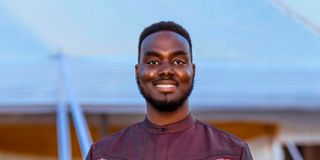
Karehe Emmanuel, 25, is a Rwandan pursuing a Master's in Architecture at People's Friendship University of Russia.
The architect of adaptation
At the age of 25, Karehe Emmanuel, left Kigali, Rwanda for Moscow, Russia. His dream is to become an architect. At 18, he had already graduated from St. Vincent’s Minor Seminary in 2017 with a good foundation in physics, chemistry, and mathematics. Without taking a gap year, he applied directly to the People’s Friendship University of Russia, otherwise known as Patrice Lumumba University, where he is now pursuing his Master’s degree in Architecture.
“I believed that travelling abroad would open my mind and expose me to a wider perspective.”
The application process was surprisingly straightforward. “I sent in my documents, the university accepted me, issued an invitation, and I applied for my visa. By September, I was on a plane,” he recalls.
Like many first-time students heading to Russia, his expectations were shaped by persistent stereotypes—harsh winters, aloof locals, and overwhelming language barriers. “Everyone warned me: Russia is cold, the people don’t talk much, and communication is tough,” he says. “Well, the cold part was true—but once I began learning the language, I discovered people were actually kind and helpful.”
Language, however, was his biggest hurdle. He enrolled in a one-year preparatory course to study Russian. “That’s when it all started to make sense,” he says. “Culture and language—they go hand in hand.”
Mental health has been a big challenge for international students, but Karehe says all he has had is stress. “I am hard on myself to be successful,” he admits. A habit he acquired in high school, dividing the day into eight hours for work, eight for unwinding, and eight for playtime kept him on an even keel. “It’s tough, but I try to stick with it. It keeps me from going crazy.”
Karehe is also connected with his fellow Rwandan students. “We meet on national days, at the embassy, or just to play football. It keeps us grounded,” he says.
To young Africans dreaming of furthering their studies abroad, Karehe advises: “Know what you want before you come. Life here isn’t perfect. But if you’re focused and willing to adapt, it’s very possible to succeed.”
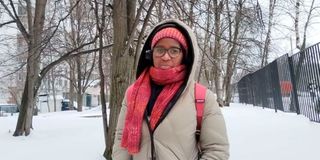
Faridah Naggayi, 31, is a Ugandan pursuing a degree at Pirogov Russian National Research Medical university.
Older student
In October 2021, Faridah Naggayi, a Ugandan, boarded a plane to Moscow, Russia, on a scholarship to fulfil her dream of studying medicine. What began as a journey driven by passion and determination soon turned into a test of mental toughness, cultural adjustment, and self-discovery.
Despite thorough preparation—like taking an online Russian language course during unexpected delays—adjusting to life and studying in Moscow proved challenging. Expectations of a cold, unwelcoming environment were defied by warm, curious locals and relatively less racism than in other countries. Yet the harsh weather, language barriers, and a demanding medical education system tested her resilience. The intense pressure soon triggered burnout, highlighting the often unseen psychological toll faced by international students navigating unfamiliar and rigorous environments far from home.
“Even after a year of learning the language, when I reached her it felt like the locals were speaking Chinese,” she says laughing. “Medical school in Russia is very rigorous. We start with cadavers from the first day, and instructors expect you to memorise everything.”
Psychological problems soon crept in. “There was a time I was like a zombie. I was exhausted, unable to sleep or eat. I later found out that I had burnout,” she says.
At 31, Faridah found herself overwhelmed—juggling the pressure of studying alongside much younger classmates and navigating an intense, high-performance education system that eventually pushed her to the edge.
“I found an older African student. She told me I wasn’t alone and helped me cope with it,” she says.
Her African student community in Moscow became her rock. “We share, and look out for each other.”
Now armed with resilience and hard-won experience, Faridah is completing her studies with hopes of returning home—not just as a qualified physician, but as a role model for other women pursuing ambitious paths abroad.
Completely silent
Nalongo Amara moves through Columbia University in New York with understated efficiency. Her dorm room window looks out over the city that never sleeps, but most nights she looks past its glitter, listening to silence. “Everything was perfect on paper,” says the 24-year-old.
“Then the visa delays happened, and my dreams felt very, very far away.”
Nalongo had received her acceptance letter and provisional funding, only to have the US embassy in Kampala suspend F-1 visa interviews weeks later. “I didn’t eat. I didn’t sleep. There was no Plan B,” she recalls. Her middle-class family in Uganda, who emptied their savings to make her journey possible, waited in suspense. When the visa was finally approved in 2021, Nalongo had four days to board a flight and start her new life.
That emotional whiplash was traumatic.
“There are days I fall completely silent, even here,” she says. “No one talks about the trauma of almost being denied a future.”
Despite Columbia’s promotion of mental health services, Nalongo has struggled to find culturally competent counselling. “The therapists are nice, but when I discuss immigration stress or being stereotyped as an African student, I get blank stares.” She then opts to internalise her distress.
Getting basic health services is also difficult. “It took three weeks to get in to see a doctor about a persistent stomachache,” she says. “And when I finally got to see a doctor, I had to repeat over and over again that spicy food was not the cause of my pain.”
Language and cultural barriers tend to make appointments more alienating than healing.
“I ended up avoiding the campus clinic altogether. It’s exhausting having to teach the doctor while you’re trying to get treated.”
Money stress is another weight. “I eat once or twice a day,” she says. Cafeteria closures and expensive takeout strain her budget. Her scholarship covers tuition, not books, housing, or therapy.
Most hurtful is institutional silence. “When the visa bans happened, no administrator called us. We were numbers in a database not students grappling with despair.”
Despite it all, Nalongo is turning her pain into poetry. She is working on an anthology about the “interior migration” between hope and disillusionment. “Writing makes me mourn, and I feel that’s more healing than anything.”
Block out homesickness
Beneath the golden skies in the US, Wesley often walks alone across Arizona State University (ASU)’s sprawling campus, earbuds in, not for music but for silence. “It helps block out the sound of expectations, of disappointment, of homesickness.”
For Wesley, anxiety and self-doubt started with a visa denial.
“Everything was arranged,” he says. “Admission, funding, even a part-time job. Then my country was added to the list. Just like that.” The weeks that followed melted into anxiety and self-doubt. “I felt punished because of my passport.”
He eventually made it to Arizona in 2019 after long petitioning and community pressure. But the emotional residue remained. “I still fear waking up and finding it’s all been revoked.”
Wesley’s financial reality is fragile. He juggles two campus jobs to afford essentials while sending a portion back home.
“People think being in America means comfort. But I’m surviving on energy bars and frozen noodles.”
Though ASU offers mental health services, the wait times are daunting.
“By the time help comes, you’ve learned to live with the pain. You build your armour.”
Even something as simple as grocery shopping has become a daily lesson in disconnection. “Most stores won’t take international cards easily,” Wesley says.
“I’ve had to leave groceries at the checkout more than once.” Without a car, making it to affordable grocery stores is tough. The ones that are within walking distance are too expensive. I cannot count the number of days that I have had canned soup just to make 20 dollars [Sh2,586] last.” Such logistical challenges, he continues, are seldom discussed in student guides or orientation programmes.
Identity bears weight as well. Wesley frequently feels like an ambassador, explaining, defending, and interpreting his background. “One of my classmates asked me if I lived in a hut. I did not even know how to answer.
A Political Science major now, Wesley channels his frustration into activism. He has started a student-led initiative to document the mental health struggles of international students. “It’s our way of refusing to be invisible.”He has begun to write op-eds, blistering, impassioned letters aimed at bureaucrats who “play chess with our futures.” Despite it all, Wesley is unapologetic. “There’s a kind of power in telling your story when the system wants you silent.”
For him, mental health is no longer a private struggle. It’s activism. “We’re told to be grateful. But I’m done whispering my pain.”

